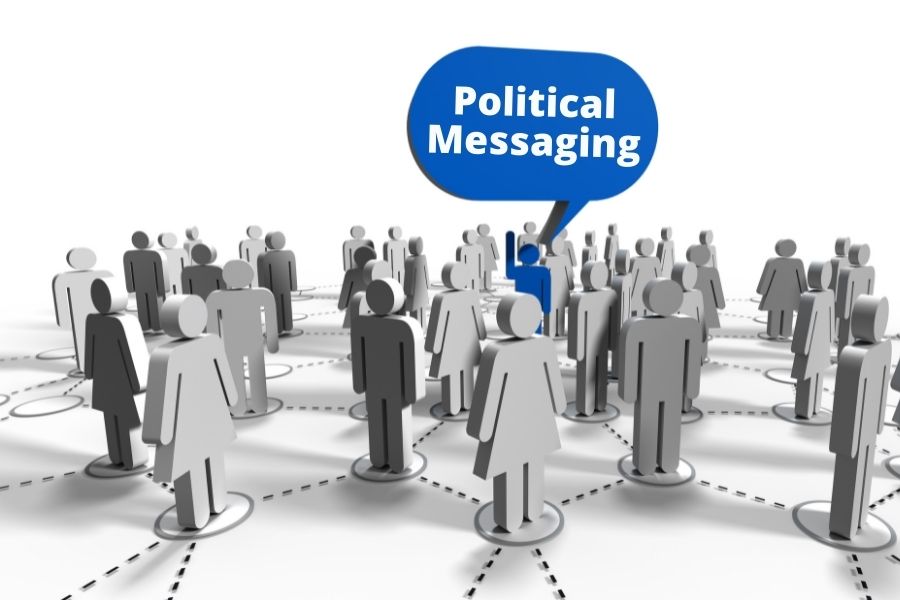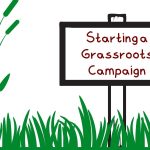In any political campaign, the goal is to persuade the public to vote for the candidate by delivering a persuasive message. For example, campaign websites serve as a central hub for communication, allowing candidates to convey their messaging effectively to a wide audience.
Developing effective political messaging can mean the difference between victory and defeat. A solid strategy helps shape the way voters see a candidate and their candidacy. Organize your website content to align with campaign messaging, particularly on your issues pages. This ensures that key messages are prominently featured and accessible to voters.
Essentials of Political Messaging Strategy
- A clear and concise message should always be the focus.
- A political candidate’s personal history can be a meaningful way to connect with voters.
- Genuine and consistent campaign messaging is most effective.
- Communicate with a strong and authentic voice.
- Create an elevator speech for your introduction to the voting public.
A core political message is the central point that a politician or party wants to get across to their supporters. This message is often about a vision for the future, patriotism and/or unity. Core messages should be woven into all aspects of your campaign – from speeches, press releases, bumper stickers, text messages, and your website.
Policy-based messages promote an idea or cause by describing it in detail. Character-based messages focus on a person’s qualities and their suitability for office. Values-related messaging relates to whether a policy is in the best interest to society. (Sometimes value platforms can be more persuasive than policy platforms.)
Crafting a Clear and Persuasive Political Message
As you develop a platform for your campaign, it’s important to know what you plan to say on your website, marketing materials, and through social media. Strong, focused communication that stays on point allows voters to easily understand your values and how you’ll work to improve their lives.
Successful political communication strategies include three crucial elements:
- It is clear and concise: Whether it’s a stump speech, article or tweet, a clear and concise message should always be the focus. Political campaign websites play a key role in ensuring clarity and consistency across all communication channels.
- It has an effective messenger: Whether you are running for congress or city council, the person delivering your message is as critical as the message itself. Good candidates listen to and build strong relationships with those they represent. They communicate with a strong and authentic voice.
- It includes a strong call to action: The most successful political campaigns have strong calls to action. One example of a call to action is the famous Reagan phrase, “It’s morning again in America.” Campaigns that inspire are more likely to win because they leave an impact with voters.
State short and state clear goals to hook voters. Voters will hear from any number of campaign sources: a candidate, campaign staff, external experts, or even volunteers. The more genuine and consistent the message is to the audience – be young millennials or older voters – the more likely that message will resonate and be effective.
Narrative Building in Political Campaigns
A narrative that embraces emotional storytelling is essential to any successful political campaign. An interesting narrative engages people and makes them feel something for your cause. This helps them feel as if they are invested in the outcome. Many candidates do this by using words like “together” and “us.”
Emphasize why it’s good for them support you and not your opponent.
When crafting a compelling story, the narrative needs to be built around a vision and mission for the future. Rallying around a specific issue is often used to develop an emotional connection.
Finally, tie it all together with language that inspires supporters and encourages them to act.
For example, suppose a candidate is passionate about education reform. Their narrative could spring from their own journey as a teacher. They’d talk about specific classroom challenges and how their educational solutions would improve student success. A story must do more than just outline policies. It has to connect emotionally with voters. In this case, the candidate would show the importance of education reform and how fits into a larger vision These types of narratives makes policy statements more personal and powerful.

Put together a good stump speech, elevator speech, and slogan as the cornerstones of your messaging.
Personal Stories: A Powerful Messaging Tool
Do you have a personal story or experience that can resonate with voters? A political candidate’s personal history can be a meaningful way to connect with people and help them relate to your platform.
For example, if you were born poor, you could describe your experiences and hardship. They could be the reason why you want to make things better for others.
Personal stories make great material for a political stump speech. A good stump speech is used throughout the election season. While it can vary in length, it is the most important speech that a candidate makes. It is told at fundraising events, rallies and when introducing themselves to groups of voters. A stump speech can be serious or humorous, but it should always keep the audience entertained.
Here an example of short stump speech:
“I grew up in a family where ends barely met. My high school diploma was more than an achievement; it was a lifeline to success. I’ve known the weight of poverty and the strength it demands. Now, as a candidate for county legislator, I’m going to fight for families like mine. My education came from life’s challenges, and it’s those lessons I’ll bring to the legislature.”
Authenticity and Consistency in Political Communications
Voters are good at detecting verbal posturing from politicians and political candidates. Saying one thing to one group of voters and something else to another will fool no one these days. The constant stream of footage and posts makes the truth much harder to conceal in the age of social media.
Inspiring or compassionate messages are most effective when they are authentic and consistent.
Populist messages are often used in political campaigns because they are easy to understand and can mobilize people. For them to be effective, they must be empathetic and inspiring.
Grassroots political campaigns mobilize and engage people who might not otherwise get involved in politics. They give people the power to make change happen. Grassroots messaging is often different from that of a large-scale campaign. For example, the narratives described will be shorter, more direct, and more emotional.
Your strategy may be influenced by the strengths and weaknesses of you and your opponents. It may also center around an issue or particular theme. You may want to highlight your own strengths such as experience or skill in that area. If your opponent is an incumbent or has a particular strength, highlighting their weaknesses could be more effective.
The Art of the Elevator Speech in Politics
An elevator speech is a short summary of who you are and what you do. Your elevator speech is the one-minute (or less) speech that you tell people who may ask, “What are you running for?” or “Why are you running for office?”
Giving stump speech is fine if you have the time. But you still need to be able to summarize yourself in a way that is concise, memorable, and compelling.
Here’s how to write a concise and impactful elevator speech.
- Introduction: Start with a brief introduction of who you are and your role or position. (doctor, lawyer, teacher).UN
- Core Message: Explain briefly why you are running for office and what you want to do if elected.
- Unique Selling Point: Tell voters why they should vote for you instead of your opponents.
- Memorable Conclusion: Offer a conclusion that is short but memorable (e.g., “I’m not a politician; I’m just a concerned citizen.”)
- Brevity is Key: Ensure the speech can be delivered in under a minute.
Your elevator speech is often your introduction to the voting public. It’s important that it makes a good impression. Take the time to come up with, write out, and refine your speech until you and your staff know it by heart.
Here’s a sample elevator speech for a candidate running for city council:
“Hello, I’m Alex Johnson, a dedicated community volunteer and small business owner. I’m running for city council to bring practical solutions and fresh energy to our local government. My focus is on improving public safety, supporting local businesses, and enhancing our public parks. What drives me is not just policy, but people. I’m here to listen, engage, and act. Imagine a city where every voice matters, where progress blooms from our shared ideas. With your support, we can turn this vision into our reality. I’m Alex Johnson, and I’m ready to lead us into a brighter, united future.”
Practice delivering your elevator speech to make it sound natural and engaging. You’ll need to because it will be repeated over and over until Election Day.
Creating Memorable Political Campaign Slogans
The next step is to strip down your overall message and create a memorable slogan for your campaign. Your slogan provides a first impression to voters as it is used in your advertising media, on everything from billboards or bumper stickers.
Your slogan should be short, simple, and catchy so that it can be easily remembered by voters. They sometimes use rhyming, alliteration, a play on words, or repetition. It doesn’t need to be overly clever or creative as long as it resonates with the audience.
For example, Obama’s 2008 “Yes We Can” campaign slogan was popular from the start. That slogan was simple and resonated with a large segment of the voting public. Other examples of clear and concise slogans are “Morning Again in America,” “I Like Ike,” or “All the Way with LBJ.”
When creating your slogan, think about the overarching goal of your campaign. This goal can be something that impacts or affects all members of the community. It can be an issue, event or even a personality trait that can help voters decide who they will cast their vote for.
Conclusion: Put together your winning message today
Campaigns are about getting your message out to the voters. They are also about staying on message. It’s important for campaigns to be authentic and not just chase what is popular at the moment.
Here is a list of some tips for staying on message:
- Make sure your messaging is active, concise, and clear.
- Use the same voice across all media channels.
- Repeat it over and over again.
- Give people something to do after they hear your message.
- Keep consistent and stay on message to get the word out.
Winning candidates create a solid communication strategy that resonates with voters. Start creating yours today!
Want to learn more? Sign up to our newsletter below for free digital campaigning tips and resources.
« How Much Should You Doctor Your Candidate Head Shots?7 Ways to Ruin Your Campaign’s Website »
Tags: local politics, messaging







